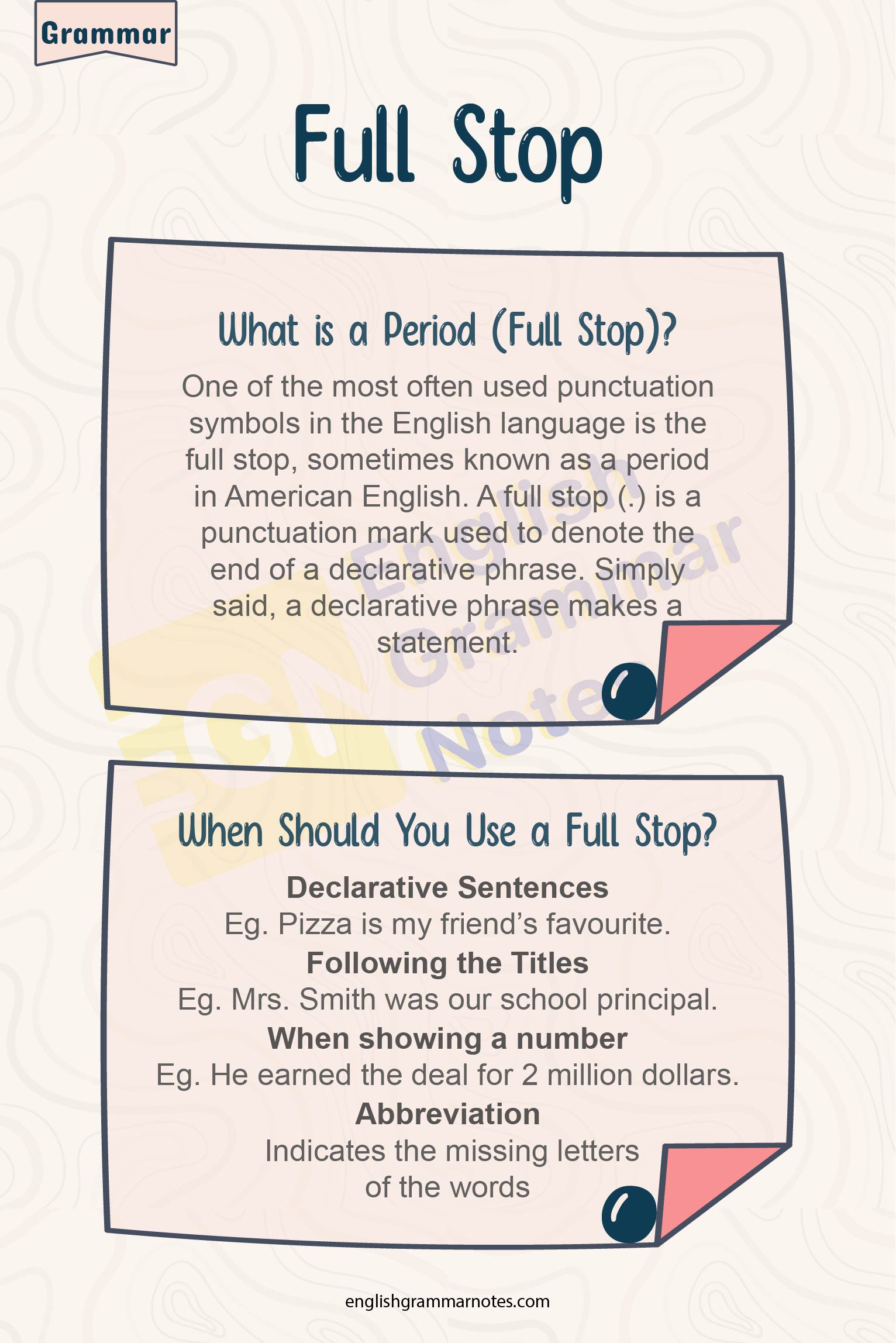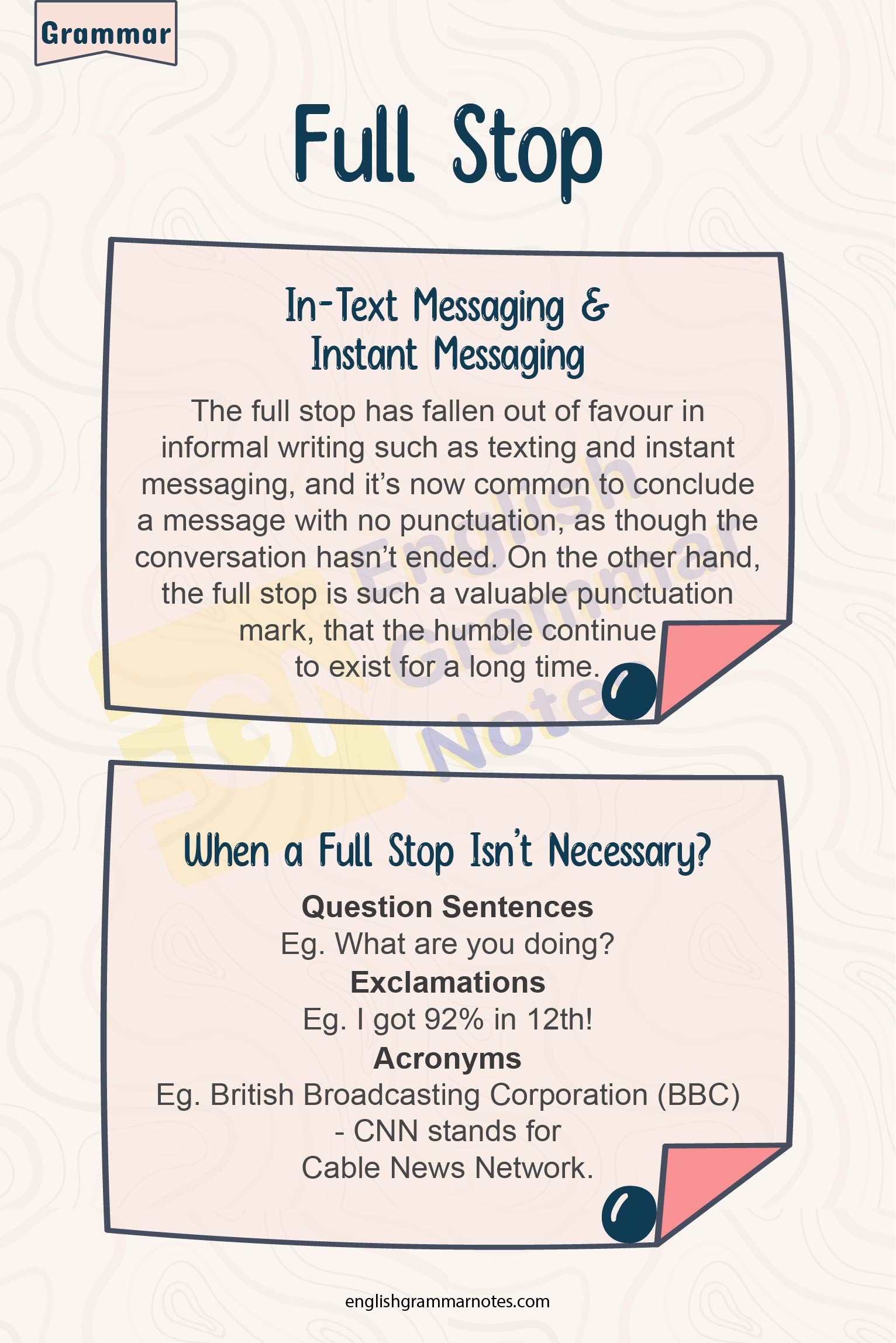Full Stop: A full stop is a punctuation symbol that we use in writing English. It is one of the most basic and common full stops used by us. The problem that arises now is, most people do not know where and where not to use full stops, which cause lots of mistakes. This article is written to know what is a full stop and where exactly to use it.
Study the most important English Vocabulary Words identified by our experts and learn the right vocabulary to use in your day to day conversations.
- What is a Period (Full Stop)?
- English in the United States vs English in the United Kingdom
- Important Points to Remember
- When Should You Use a Full Stop?
- When a Full Stop Isn’t Necessary?
- In-Text Messaging And Instant Messaging
- Full Stop Mistakes You Should Avoid
What is a Period (Full Stop)?
One of the most often used punctuation symbols in the English language is the full stop, sometimes known as a period in American English. A full stop (.) is a punctuation mark used to denote the end of a declarative phrase. Simply said, a declarative phrase makes a statement. There are additional applications as well, which we will discuss further down. According to text analysis, full stops account for around half of all punctuation marks used.
A full stop is typically used at the end of a declarative sentence or a comprehensive statement. Following an abbreviation, this punctuation mark is also used. A full stop can also be used to conclude a group of words that do not form a complete sentence.
English in the United States vs English in the United Kingdom
The full stop is commonly referred to as a period in American English. Aside from the nomenclature, there are only minor distinctions in how the full stop or period is used. Individuals from the United Kingdom, for example, are considerably more likely to shorten their country to ‘UK.’ However, in the United States, it is far more likely to be written as ‘USA.’
In a similar vein, American English is more likely to write someone’s name with a period after it, such as ‘Mr. Jones,’ but British English is more likely to write it as ‘Mr. Jones.’ Aside from these minor distinctions, the period and full stop are employed in comparable ways, particularly in declarative sentences.
Important Points to Remember
At the end of sentences that simply remark, we should always use periods or full stops. An exclamation point should be used to demonstrate intensity or excitement. If the sentence is a question, a question mark should be used. Remember that these three punctuation marks are the only way to conclude a sentence, so you won’t go far wrong if you know how to use all three correctly.
When Should You Use a Full Stop?
A full stop can be used in a variety of ways, as we’ve already discussed. We’ll take a closer look at this in the sections below, and perhaps you’ll realize why we use full stops in the way we do. We’ll also go through a few more scenarios that we haven’t discussed previously.

Declarative Sentences
A declarative sentence, once again, merely makes a statement. Unless you’re using a different sentence type (more on that later), you’re most likely using a declarative sentence, in which case a full stop should be used. Some instances are as follows:
- Pizza is my friend’s favourite.
- Black is my favourite colour.
- The party is scheduled for next Monday.
Following the Titles
But keep in mind that this is more typical in American English than in British English. Here are a few more instances:
- Mrs. Sharma was a very lovely person.
- Dr. Martin was always the best doctor.
- Mrs. Smith was our school principal.
When showing a number containing a decimal, we also utilize full stops as a decimal point. Consider the following scenario:
- He earned the deal for 2 million dollars.
- Cloth taxes increased by 10 percent over the previous year.
- In the winter, hot days are very hard to handle.
Abbreviation
When we shorten or abbreviate words, we frequently employ full stops to indicate that some letters within the word have been omitted. Although we’ve already explored the differences between British and American English (UK vs the USA), there are several instances where both countries utilize abbreviations and full stops. Consider the following scenario:
etc./i.e/e.g
When a Full Stop Isn’t Necessary?
Remember how we said that unless you’re using a different sentence form, you’re probably using a declarative sentence and should use a full stop? The only time a full stop isn’t appropriate is when another punctuation mark better conveys the sentence’s tone. Here are some examples of additional sentence forms that should be punctuated differently.

Question Sentences
A question mark should always be used at the end of a question. You can also use question marks after a statement to express surprise or uncertainty, although this is done aesthetically for tone. Here are two methods to conclude a statement with a question mark rather than a full stop:
- What are you doing?
- Where are you going?
Exclamations
We should utilize an exclamation point when we employ exclamations. Exclamation points are used to convey excitement or emphasis. Exclamation points should be used sparingly in a paragraph since they lose part of their impact overused. Here are several instances where an exclamation point is preferable to a full stop:
- I got 92% in 12th!
- I am so excited to go!
Acronyms
Some acronyms and initialisms used to be written with full stops between the individual letters, although they are now frequently written without punctuation. Here are a few well-known examples:
- British Broadcasting Corporation (BBC)
- CNN stands for Cable News Network.
- English as a Foreign Language (EFL) is a term that refers to the study of English as a second language
- English as a Second Language (ESL) is a term that refers to the study of English as a second language
- The FBI (Federal Bureau of Investigation) is a government agency that investigates crimes.
- NATO is an acronym for the North Atlantic Treaty Organization.
- The UK stands for the United Kingdom.
- UNICEF stands for the United Nations International Children’s Emergency Fund.
In-Text Messaging And Instant Messaging
The full stop has fallen out of favour in informal writing such as texting and instant messaging, and it’s now common to conclude a message with no punctuation, as though the conversation hasn’t ended. According to some linguists, finishing a message with a full stop in this context might be taken as signalling more than just the conclusion of a phrase – it could mean that the conversation/discussion is done or that the writer is furious or sarcastic.
I’m undecided on how I feel about this. I still use full stops after my texts because it feels natural and ‘proper.’ Is it possible that I’m suddenly in the minority? Maybe.
What I do notice is that we’re using less and less punctuation, including the full stop, and I understand that this is all part of the natural evolution of language and language use. On the other hand, the full stop is such a valuable punctuation mark, in many situations vital, that the humble will continue to exist for a long time.
Full Stop Mistakes You Should Avoid
Aside from misusing a full stop for an inquiry or an exclamatory statement, the most common full stop mistakes include other punctuation marks. We’ll go over the most prevalent blunders in these situations in the next section.
Quotation Marks and Periods
When employing quotation marks in a piece, the period can be placed incorrectly. We’ll show you how to write it correctly in the examples below:
- “I am going to the market”, she said.
Try rereading the first option, this time emphasizing the period in the quote marks. Have you noticed how difficult it is to read? We only use a period after the whole sentence, even though the statement is complete within the quotation marks. As a result, when a citation precedes the rest of the sentence, we use a comma followed by a period at the end of the entire sentence. What if, on the other hand, the quote mark appears last?
- “I am gonna miss you”, she said.
Parentheses and Periods
Similarly, mistakes with parenthesis and periods are common. Below, we’ll show you how to write them correctly:
- She was ready to go (except her parents were not ready).
Use of Periods in Sentences Examples
When a declarative sentence comes to a close.
- Dogs are so precious
- She loves candies
- My favourite colour is black.
- He loves travelling.
English as it is spoken in the United States
Examples:
Mr., Mrs., Dr., Mr., Mrs., Mr., Mrs., Mr., Mrs., Mr., Mrs., Mr., Mrs., Mr., Mrs
Here are some examples of sentences:
- Mr. Smith owes him a large sum of money.
- Dr. Smith teaches us about botany.
- In terms of numbers.
Numbers
- In January, retail sales declined by 1.3 percent.
- The average cost of items increased by only 2.2%.
After a short abbreviation
Examples:
approx. : roughly, etc.: And so forth, for example, That is, in other words, government: Administration adm. in the government
Here are some examples of sentences:
- On June 20, 1980, they were apprehended.
- We have mutual friends, enemies, and other relationships.
- The price should be more realistic, i.e. less expensive.